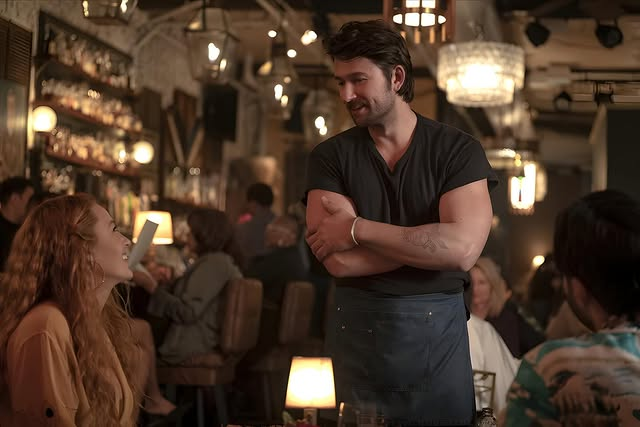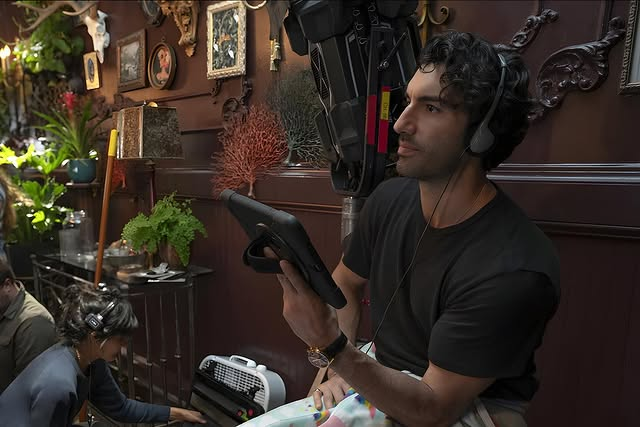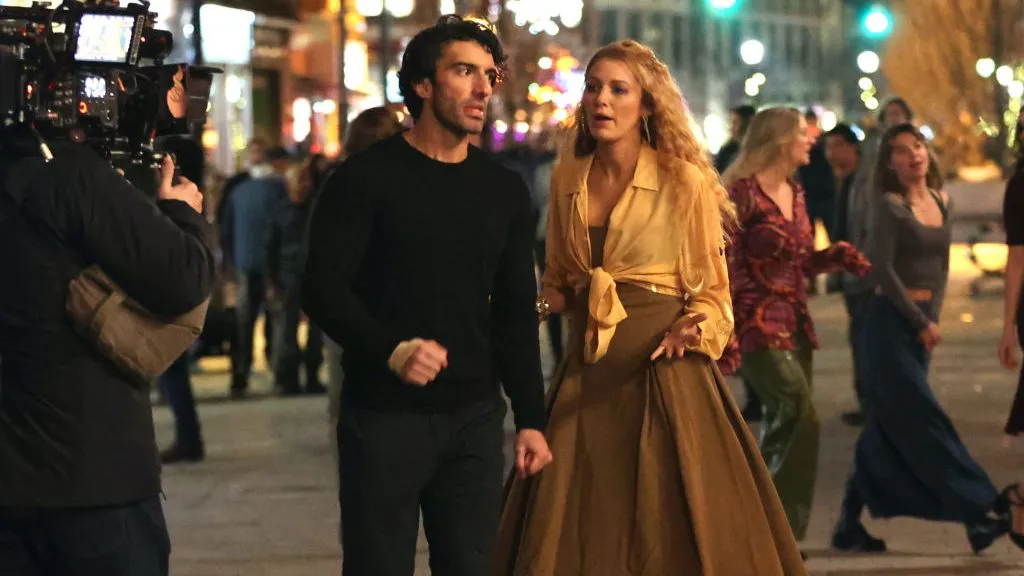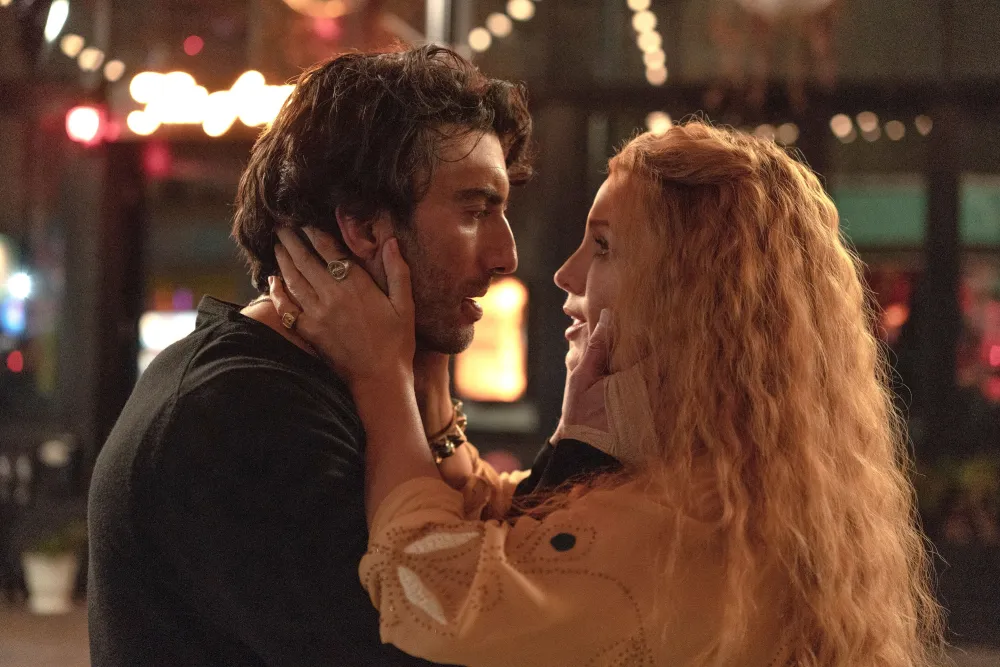A Timeline of It Ends With Us Costars Blake Lively and Justin Baldoni’s Legal Battle
Quote from Oladosun Joshua Segun on January 16, 2025, 9:24 PM
Blake Lively and Justin Baldoni made headlines not only for their roles in "It Ends With Us" but also for a rumored legal battle that caught public attention. As fans eagerly anticipated the film adaptation of Colleen Hoover's bestselling novel, the alleged conflict added a twist that left many curious.
"It Ends With Us" took the literary world by storm, selling over 1 million copies in its first year alone. The book generated massive buzz across social media, with hashtags trending for weeks. Fans were drawn to its emotional depth, while critics praised its handling of complex themes.
- Sales Figures: Over 1 million copies sold in the first year.
- Social Media Engagement: Thousands of posts shared under #ItEndsWithUs, with millions of interactions.
Reviews highlighted the story's raw honesty. Critics noted its exploration of tough subjects, making it relatable for many readers.
Blake Lively and Justin Baldoni have built strong public images. Lively is known for her charm and versatility, while Baldoni is recognized for his heartfelt performances. Their casting sparked excitement.
- Fan Reactions: Social media overflowed with excitement, with fans expressing support and high hopes for the adaptation.
However, the anticipation set a high bar, creating pressure that influenced later events. As the film gears up for production, whispers of a legal dispute began swirling. Fans and observers speculated on the nature of it, leading to widespread intrigue.
Rumors about a conflict between Lively and Baldoni started from sources with questionable credibility. The initial reports hinted at disagreements over creative differences, which stoked the fires of speculation among fans. Many early reports lacked concrete evidence.
These rumors quickly snowballed, with the drama becoming a hot topic among dedicated followers of both stars. The role of social media cannot be understated. Tweets and Instagram posts exploded, with fans sharing their theories and opinions.
In early 2023, it was announced that they would star in the film adaptation of Colleen Hoover's novel of the same name and that Baldoni would direct. Production began that May 2023 but paused mid-June amid the Writers Guild America strike. What happened during that production period is what Lively & Baldoni disagree on in their lawsuits.
In both her lawsuit filed against Baldoni, his company Wayfarer Studios and others in New York Dec. 31 and her California Civil Rights Department complaint submitted earlier that month, Lively alleged she “and other cast and crew experienced invasive, unwelcome, unprofessional and sexually inappropriate behavior” by him and his company’s CEO/producer Jamey Heath (who is also listed as a defendant in both filings) on the set of It Ends With Us.
She stated in the filings obtained that she “attempted to address and resolve the problems on set” before returning to production and that her attorneys sent Wayfarer’s lawyer a “Protections for Return to Production” document in November 2023 after the WGA and subsequent SAG-AFTRA strikes ended
- Examples: Tweets tagged with #TeamBlake or #TeamJustin took off, creating a divide in the fandom.
- Impact of Algorithms: The algorithms amplified sensational content, pushing the narrative further into the spotlight.
According to her filings, a meeting attended by Lively, her husband Ryan Reynolds, Baldoni, Heath, other producers and a representative for the film’s distributor Sony Pictures took place in New York on Jan. 4, 2024 to “address the hostile work environment that nearly derailed production of the Film.”
After discussing “at length the details of concerns that had been expressed by Ms. Lively and others,” her filings state, “the parties agreed to implement and follow the Protections for Return to Production to ensure that the Film could be completed, marketed, and released safely and successfully.”
As the rumors became more persistent, both actors' representatives issued official statements. These communications aimed to clarify the situation but only served to deepen the intrigue.
- Statements: While downplaying the rumors, they acknowledged ongoing conversations, leaving room for interpretation.
Such statements shaped public perception, leading some fans to believe that a serious issue was at play. While no substantial legal documents emerged publicly, industry insiders speculated about potential legal actions. Experts weighed in, discussing the kinds of disputes that could arise.
- Expert Analyses: Legal professionals pointed out the nuances of contract disputes common in the film industry.
However, Baldoni, Wayfarer, Heath and others listed in Lively’s CRD complaint paint a different picture. In a libel lawsuit they filed against The New York Times Dec. 31 for its Dec. 21 article about an alleged retaliatory smear campaign the plaintiffs purportedly orchestrated against Lively—with the article citing her CRD complaint—they accused her of embarking on a “hostile takeover of the production.”
“Lively waged war on Baldoni, weaponizing innocuous interactions from May and June 2023—long before there was any tension between them—to vilify and discredit him,” the lawsuit obtained. “At the time, Baldoni and Lively had a solid working relationship, and Lively expressed no unease around him. Only after the writer’s strike had ended and filming was set to resume did Lively express any concern about returning to set.”
The lawsuit also says Wayfarer "promptly agreed to her terms" in the Protections for Return to Production document “despite disagreeing with the insinuations underlying them”—adding that some terms were already in place.
“Neither Wayfarer, Heath, nor Baldoni had engaged in any of the behavior alluded to in the Return to Production document, nor did they plan to,” the lawsuit reads. “They thought that was the end of it, and they were ready to move ahead and make a great film.”
Major media outlets started covering the story, each with varying degrees of focus on different aspects. Some presented balanced views, while others leaned toward sensationalism. Sensationalized headlines dominated conversations. Phrases like “Blake and Justin’s Feud!” created a misleading impression.
- Examples: Sensational articles typically featured exaggerated claims that strayed from the facts.
In The New York Times lawsuit, the plaintiffs alleged Baldoni, Heath, other producers and the Sony representative went to Lively and Reynolds’ New York penthouse Jan. 4 to discuss resuming filming the next day.
“Instead, they were blindsided by Lively and Reynolds , who presented a list of grievances that were both anticipated and troubling,” the lawsuit adds. “Reynolds launched into a tirade, berating Baldoni in what Baldoni later described as a ‘traumatic’ encounter, stating he had ‘never been spoken to like that in his life.'"
News outlets reached out to Reynolds’ rep for comment but has not heard back. While the plaintiffs called The New York Times’ report “false and defamatory,” the outlet stands by its reporting—saying the article was “meticulously and responsibly reported.”
It Ends With Us premiered in August, and Lively’s filings note “the film has been a resounding success.” However, she alleged in both complaints that Baldoni and his Wayfarer associates embarked on a “digital retaliation campaign” with the help of his publicist Jennifer Abel and crisis communication specialist Melissa Nathan for her raising concern about the alleged misconduct on set.
In The New York Times lawsuit, the plaintiffs—who also include Nathan and Abel—denied accusations of a retaliatory campaign and allege “that it was Lively, not Plaintiffs, who engaged in a calculated smear campaign.” The actress denied in The New York Times article that she or her reps planted or spread negative information about Baldoni or his company Wayfarer.
Such coverage amplified public interest, but also misrepresented the reality of the situation. The rumors sparked discussions about potential delays in the film's production schedule. Questions arose regarding the actors' commitment and the film's overall direction.
- Production Delays: Speculations suggested that the conflict could impact timelines.
Casting and marketing strategies might also face complications as a result of the ongoing saga. The legal ramifications of disputes like this can be severe. They not only affect the individuals involved but can also set precedents for future collaborations.
- Future Projects: Legal disputes often prompt studios to reassess contracts and partnerships, making actors more cautious.
The timeline of events leading up to the alleged legal battle unveils a mixture of reality and rumor. The speculation surrounding Lively and Baldoni reflects not only on them but also on the industry's broader dynamics.
- Major Events: From early rumors to official statements, the incident serves as a lesson on the power of media.
The next update in the legal battle came Jan. 16, when Wayfarer, Baloni, Heath, Nathan, Abel and production entity It Ends With Us Movie LLC sued Lively, Reynolds, her publicist Leslie Sloane and Sloane’s firm Vision PR for extortion, defamation and other causes of action.
In the filing obtained, the plaintiffs again accused Lively of using her “power to seize control” of It Ends With Us and working with others—including Sloane and Wayfarer’s former publicist Stephanie Jones—to implement a “vile smear campaign against Baldoni and Wayfarer to deflect attention and blame for Lively’s disastrous misjudgments” during the marketing of the film. They also denied her accusations of sexual harassment and of launching a smear campaign against her.
“Lively, working with her husband, her publicist, and Jones, among others, set out on a campaign to tar and feather Plaintiffs in the press,” the lawsuit reads. “They conspired and worked in concert with the New York Times to put out a blockbuster news report as devastating as it was false.”
News outlets has reached out to reps for the defendants and Jones for comment but has yet to hear back. While Looking ahead, the film's release might face challenges but could ultimately recover if handled well. Both actors have dedicated fanbases that may rally around them regardless of the disruption.
- Future Reception: If the film delivers on its promise, most fans will likely support it wholeheartedly.
- Long-term Consequences: Lively and Baldoni could emerge stronger, learning from this experience to navigate future projects more smoothly.
The story surrounding “It Ends With Us” serves as a captivating case study in the intersection of media, celebrity, and public perception.

Blake Lively and Justin Baldoni made headlines not only for their roles in "It Ends With Us" but also for a rumored legal battle that caught public attention. As fans eagerly anticipated the film adaptation of Colleen Hoover's bestselling novel, the alleged conflict added a twist that left many curious.
"It Ends With Us" took the literary world by storm, selling over 1 million copies in its first year alone. The book generated massive buzz across social media, with hashtags trending for weeks. Fans were drawn to its emotional depth, while critics praised its handling of complex themes.

- Sales Figures: Over 1 million copies sold in the first year.
- Social Media Engagement: Thousands of posts shared under #ItEndsWithUs, with millions of interactions.
Reviews highlighted the story's raw honesty. Critics noted its exploration of tough subjects, making it relatable for many readers.
Register for Tekedia Mini-MBA edition 16 (Feb 10 – May 3, 2025) today for early bird discounts.
Tekedia AI in Business Masterclass opens registrations.
Join Tekedia Capital Syndicate and co-invest in great global startups.
Register to become a better CEO or Director with Tekedia CEO & Director Program.
Blake Lively and Justin Baldoni have built strong public images. Lively is known for her charm and versatility, while Baldoni is recognized for his heartfelt performances. Their casting sparked excitement.
- Fan Reactions: Social media overflowed with excitement, with fans expressing support and high hopes for the adaptation.
However, the anticipation set a high bar, creating pressure that influenced later events. As the film gears up for production, whispers of a legal dispute began swirling. Fans and observers speculated on the nature of it, leading to widespread intrigue.

Rumors about a conflict between Lively and Baldoni started from sources with questionable credibility. The initial reports hinted at disagreements over creative differences, which stoked the fires of speculation among fans. Many early reports lacked concrete evidence.
These rumors quickly snowballed, with the drama becoming a hot topic among dedicated followers of both stars. The role of social media cannot be understated. Tweets and Instagram posts exploded, with fans sharing their theories and opinions.

In early 2023, it was announced that they would star in the film adaptation of Colleen Hoover's novel of the same name and that Baldoni would direct. Production began that May 2023 but paused mid-June amid the Writers Guild America strike. What happened during that production period is what Lively & Baldoni disagree on in their lawsuits.
In both her lawsuit filed against Baldoni, his company Wayfarer Studios and others in New York Dec. 31 and her California Civil Rights Department complaint submitted earlier that month, Lively alleged she “and other cast and crew experienced invasive, unwelcome, unprofessional and sexually inappropriate behavior” by him and his company’s CEO/producer Jamey Heath (who is also listed as a defendant in both filings) on the set of It Ends With Us.

She stated in the filings obtained that she “attempted to address and resolve the problems on set” before returning to production and that her attorneys sent Wayfarer’s lawyer a “Protections for Return to Production” document in November 2023 after the WGA and subsequent SAG-AFTRA strikes ended
- Examples: Tweets tagged with #TeamBlake or #TeamJustin took off, creating a divide in the fandom.
- Impact of Algorithms: The algorithms amplified sensational content, pushing the narrative further into the spotlight.
According to her filings, a meeting attended by Lively, her husband Ryan Reynolds, Baldoni, Heath, other producers and a representative for the film’s distributor Sony Pictures took place in New York on Jan. 4, 2024 to “address the hostile work environment that nearly derailed production of the Film.”
After discussing “at length the details of concerns that had been expressed by Ms. Lively and others,” her filings state, “the parties agreed to implement and follow the Protections for Return to Production to ensure that the Film could be completed, marketed, and released safely and successfully.”

As the rumors became more persistent, both actors' representatives issued official statements. These communications aimed to clarify the situation but only served to deepen the intrigue.
- Statements: While downplaying the rumors, they acknowledged ongoing conversations, leaving room for interpretation.
Such statements shaped public perception, leading some fans to believe that a serious issue was at play. While no substantial legal documents emerged publicly, industry insiders speculated about potential legal actions. Experts weighed in, discussing the kinds of disputes that could arise.
- Expert Analyses: Legal professionals pointed out the nuances of contract disputes common in the film industry.
However, Baldoni, Wayfarer, Heath and others listed in Lively’s CRD complaint paint a different picture. In a libel lawsuit they filed against The New York Times Dec. 31 for its Dec. 21 article about an alleged retaliatory smear campaign the plaintiffs purportedly orchestrated against Lively—with the article citing her CRD complaint—they accused her of embarking on a “hostile takeover of the production.”

“Lively waged war on Baldoni, weaponizing innocuous interactions from May and June 2023—long before there was any tension between them—to vilify and discredit him,” the lawsuit obtained. “At the time, Baldoni and Lively had a solid working relationship, and Lively expressed no unease around him. Only after the writer’s strike had ended and filming was set to resume did Lively express any concern about returning to set.”
The lawsuit also says Wayfarer "promptly agreed to her terms" in the Protections for Return to Production document “despite disagreeing with the insinuations underlying them”—adding that some terms were already in place.
“Neither Wayfarer, Heath, nor Baldoni had engaged in any of the behavior alluded to in the Return to Production document, nor did they plan to,” the lawsuit reads. “They thought that was the end of it, and they were ready to move ahead and make a great film.”

Major media outlets started covering the story, each with varying degrees of focus on different aspects. Some presented balanced views, while others leaned toward sensationalism. Sensationalized headlines dominated conversations. Phrases like “Blake and Justin’s Feud!” created a misleading impression.
- Examples: Sensational articles typically featured exaggerated claims that strayed from the facts.
In The New York Times lawsuit, the plaintiffs alleged Baldoni, Heath, other producers and the Sony representative went to Lively and Reynolds’ New York penthouse Jan. 4 to discuss resuming filming the next day.
“Instead, they were blindsided by Lively and Reynolds , who presented a list of grievances that were both anticipated and troubling,” the lawsuit adds. “Reynolds launched into a tirade, berating Baldoni in what Baldoni later described as a ‘traumatic’ encounter, stating he had ‘never been spoken to like that in his life.'"
News outlets reached out to Reynolds’ rep for comment but has not heard back. While the plaintiffs called The New York Times’ report “false and defamatory,” the outlet stands by its reporting—saying the article was “meticulously and responsibly reported.”

It Ends With Us premiered in August, and Lively’s filings note “the film has been a resounding success.” However, she alleged in both complaints that Baldoni and his Wayfarer associates embarked on a “digital retaliation campaign” with the help of his publicist Jennifer Abel and crisis communication specialist Melissa Nathan for her raising concern about the alleged misconduct on set.
In The New York Times lawsuit, the plaintiffs—who also include Nathan and Abel—denied accusations of a retaliatory campaign and allege “that it was Lively, not Plaintiffs, who engaged in a calculated smear campaign.” The actress denied in The New York Times article that she or her reps planted or spread negative information about Baldoni or his company Wayfarer.
Such coverage amplified public interest, but also misrepresented the reality of the situation. The rumors sparked discussions about potential delays in the film's production schedule. Questions arose regarding the actors' commitment and the film's overall direction.
- Production Delays: Speculations suggested that the conflict could impact timelines.
Casting and marketing strategies might also face complications as a result of the ongoing saga. The legal ramifications of disputes like this can be severe. They not only affect the individuals involved but can also set precedents for future collaborations.
- Future Projects: Legal disputes often prompt studios to reassess contracts and partnerships, making actors more cautious.
The timeline of events leading up to the alleged legal battle unveils a mixture of reality and rumor. The speculation surrounding Lively and Baldoni reflects not only on them but also on the industry's broader dynamics.
- Major Events: From early rumors to official statements, the incident serves as a lesson on the power of media.
The next update in the legal battle came Jan. 16, when Wayfarer, Baloni, Heath, Nathan, Abel and production entity It Ends With Us Movie LLC sued Lively, Reynolds, her publicist Leslie Sloane and Sloane’s firm Vision PR for extortion, defamation and other causes of action.
In the filing obtained, the plaintiffs again accused Lively of using her “power to seize control” of It Ends With Us and working with others—including Sloane and Wayfarer’s former publicist Stephanie Jones—to implement a “vile smear campaign against Baldoni and Wayfarer to deflect attention and blame for Lively’s disastrous misjudgments” during the marketing of the film. They also denied her accusations of sexual harassment and of launching a smear campaign against her.
“Lively, working with her husband, her publicist, and Jones, among others, set out on a campaign to tar and feather Plaintiffs in the press,” the lawsuit reads. “They conspired and worked in concert with the New York Times to put out a blockbuster news report as devastating as it was false.”
News outlets has reached out to reps for the defendants and Jones for comment but has yet to hear back. While Looking ahead, the film's release might face challenges but could ultimately recover if handled well. Both actors have dedicated fanbases that may rally around them regardless of the disruption.
- Future Reception: If the film delivers on its promise, most fans will likely support it wholeheartedly.
- Long-term Consequences: Lively and Baldoni could emerge stronger, learning from this experience to navigate future projects more smoothly.
The story surrounding “It Ends With Us” serves as a captivating case study in the intersection of media, celebrity, and public perception.
Uploaded files:


